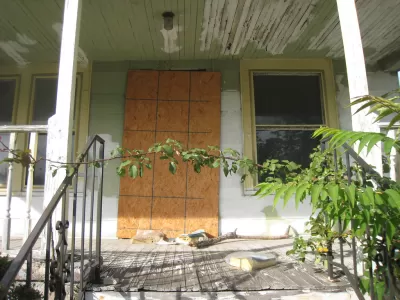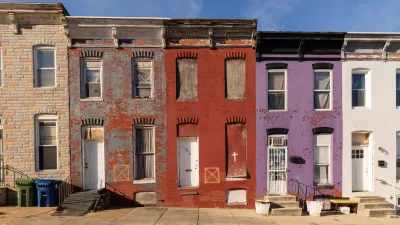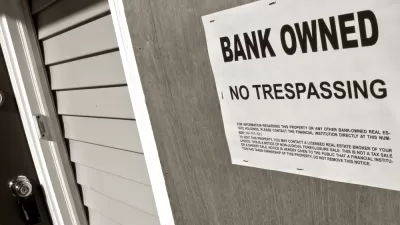Surveyors hitting the streets in Cleveland have found that the problem of vacant homes in the city isn't as bad as first feared.

Through a partnership with the non-profit Thriving Communities Institute, Cleveland is getting a better hand on understanding its stock of vacant homes that litter parts of the city. Michelle Jarboe of the Cleveland Plain Dealer reports that an assessment carried out by Thriving Communities, using a 16-person team, has determined that 8.8 percent of the 158,851 properties surveyed can be classified as being vacant. Of those, more than a third "might be a lost cause." This would result in a total of 6,100 structures that would need to be demolished, at a cost of $60 million to the city. However, there is an upside to the survey results.
Here's the good news: The blight isn't as bad as it appeared, based on past estimates from the city and other researchers…
The pool of deeply tainted properties actually has been shrinking, thanks to demolition, fewer foreclosures and a healthier housing market. The tally of decrepit houses fell from 2013, when the city found more than 7,700 distressed or empty homes. Nearly every neighborhood saw improvement.
Jarboe reports that a recent study found that demolition programs for vacant properties in other cities, including Detroit, has resulted in the value of occupied homes within 500 feet of the demolished property increasing 4.3 percent.
FULL STORY: Vacant houses, blighted buildings still plague Cleveland, but problem is shrinking: Taking Stock

Maui's Vacation Rental Debate Turns Ugly
Verbal attacks, misinformation campaigns and fistfights plague a high-stakes debate to convert thousands of vacation rentals into long-term housing.

Planetizen Federal Action Tracker
A weekly monitor of how Trump’s orders and actions are impacting planners and planning in America.

In Urban Planning, AI Prompting Could be the New Design Thinking
Creativity has long been key to great urban design. What if we see AI as our new creative partner?

Cal Fire Chatbot Fails to Answer Basic Questions
An AI chatbot designed to provide information about wildfires can’t answer questions about evacuation orders, among other problems.

What Happens if Trump Kills Section 8?
The Trump admin aims to slash federal rental aid by nearly half and shift distribution to states. Experts warn this could spike homelessness and destabilize communities nationwide.

Sean Duffy Targets Rainbow Crosswalks in Road Safety Efforts
Despite evidence that colorful crosswalks actually improve intersection safety — and the lack of almost any crosswalks at all on the nation’s most dangerous arterial roads — U.S. Transportation Secretary Duffy is calling on states to remove them.
Urban Design for Planners 1: Software Tools
This six-course series explores essential urban design concepts using open source software and equips planners with the tools they need to participate fully in the urban design process.
Planning for Universal Design
Learn the tools for implementing Universal Design in planning regulations.
Appalachian Highlands Housing Partners
Gallatin County Department of Planning & Community Development
Heyer Gruel & Associates PA
Mpact (founded as Rail~Volution)
City of Camden Redevelopment Agency
City of Astoria
City of Portland
City of Laramie




























